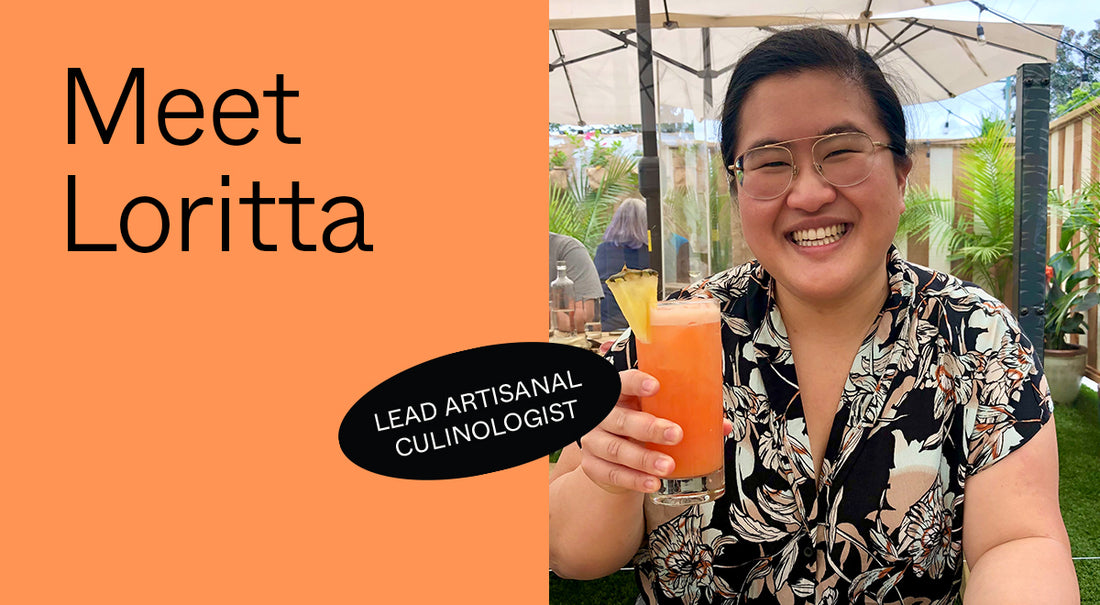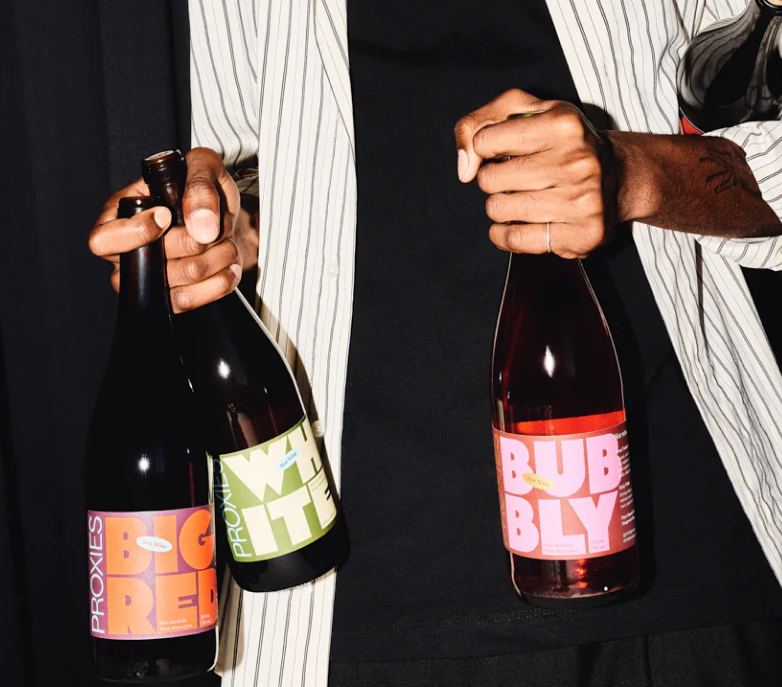
What's A Culinologist?
Share
Coming off Canada Day and the Fourth of July, we’ve been thinking a lot about our own heritage. We don’t talk a lot about who we are but we want to change that. Today, that starts with the person who develops our most experimental products and the reigning title holder for best job title at Acid League, Lead Artisanal Culinologist Loritta Lin.
Loritta is a graduate of both the food science program at the University of Guelph and the accelerated culinary program at the Culinary Institute of America in Napa—a trained food scientist and chef. And while you might think she made it up, culinology is a combination of two words: "culinary" and "technology," aka Loritta herself.
At Acid League, Loritta draws on her training to develop all our culinary experimentals like our recently released Better Barbecue condiments, and upcoming Umami Kit (spoiler alert: coming soon!). She also works closely with the rest of our product development team to create all our retail offerings (spoiler alert #2: there are a lot more of those coming your way soon too!), bringing a dynamic combination of culinary know-how, unending curiosity, and scientific precision to everything she touches.
Read on to learn more about how Loritta approaches her role and how she became the amazing artisanal culinologist she is today.

I’m not sure I’ve ever met a culinologist before, but what makes the intersection of cooking and science so interesting to you?
I think it's so important that people in food science have a culinary background of some sort. People go into food science and work in large manufacturing companies and sometimes don’t even know how to cook. Like, you're making food for all these people and you don't know how to cook? That blows my mind.
There were people in my food science program who didn't care about food, which I guess is fair if you’re going into research, not industry. You don't have to be obsessed. You don't have to be a professional chef. But like, what are you even doing? I think you should at least appreciate food and know some basics like what flavors pair well together.
What is the focus of a food science program?
It actually varies depending on where you go to school. In our case, it was very large-scale manufacturing, and industry based. We really focused on food chemistry, food engineering principles, processing principles, things like that. And then in our final year, more specific courses like cereal grains processing, meat processing, and dairy processing, and a lot of really good hands-on experience in our pilot plant. But from a manufacturing standpoint, I think there is a disconnect between the actual food and processes. I do think they should implement a cooking class to provide some sort of foundation. I think I’m also just biased because I actually enjoy cooking.
So what does the job of Lead Artisanal Culinologist entail?
My main role is to look into unique ingredients and try to bring them to the forefront by developing cool products—taking seasonal and local ingredients and playing around with fermentation and preservation techniques.
How do you approach the research and product development process?
It’s just that—a lot of research and experimentation, both with flavors I’m familiar with and ones that are new to me.
At culinary school, I was exposed to a lot of cuisines that I wasn’t super familiar with. So that kind of piqued my interest as a starting point for a lot of ideas. For instance, I was never really that familiar with Middle Eastern cuisine, so when I was exposed to that it was really exciting. And I realized that there were a lot of really cool flavors going on in Middle Eastern cuisine that I'm just so unfamiliar with. Like salt preserved lemons—so now I have a bunch of unique types of citrus and I’m preserving them in the same way. So I guess my approach is typically I have some starting point and then I dig a little bit deeper and try and pull unique flavors from different cuisines.
Are there any other techniques or cuisines you want to explore in upcoming products?
We’re a fermentation company, so I really want to focus on figuring out all the different fermentation techniques developed across cultures and play around with the flavors that can be developed. Really dig into what is grown locally, and be able to preserve that in different ways.
We’re also an acidity company, so what do you like about using acidity in your products and in your cooking?
Acidity is cool because it can be just a little touch at the end to brighten a dish but it can also be the primary flavor in a dish, or condiment, or whatever product I'm working on. In a lot of the products, though, acidity is also a key component for shelf stability and food safety. It brings a lot of flavor, but it’s also really helpful for preservation.
Culinologist isn’t a job many kids aspire to, but have you always been interested in food?
My parents, actually my whole family including extended family, are all just super obsessed with food. When I go to Taiwan to visit relatives we’ll be sitting there eating lunch and be like, ‘Alright, what should we have for dinner tonight?’ Food has always been very prominent in my life. Both of my parents are really good cooks.
My parents are both Taiwanese but my dad is also part Japanese. They both lived in Japan for a few years too so there was a lot of Japanese influence in what they cooked for us. But my dad's also obsessed with wine and loves European culture so growing up I was always exposed to different types of food. And I always helped my parents cook.
What did you eat growing up?
A lot of the food we ate growing up was pretty simple. My favorite dish, though, that they would always make was oxtail stew. It kind of had a base that was similar to Taiwanese beef noodle soup. I would come home from school, my mom would be cooking it and I could smell it from outside and it was the most exciting afternoon ever if I could smell it.
We also had a lot of stir fries, but they were always much lighter than the typical Chinese stir fries. And I think that’s partially due to Japanese influence. But then my parents also made pasta and we would have charcuterie—I was that kid in fourth grade who would go to school with cheese, grapes, and crackers. Like brie, not Kraft singles. I’ll admit, it feels a bit excessive in hindsight, but it was very tasty.
Did you eat any westernized Chinese food growing up?
Yeah, there was actually this restaurant called Pink Flamingo and it was my grandpa’s favorite. Have you had yin and yang fried rice before? It's so good. And like, so random. It's fried rice but on top they have a red sauce and a white sauce. But yeah, we ate a lot of westernized Chinese.
The whole idea of authenticity in food is really interesting to me because westernized Chinese food is not really close to actual Chinese food from China. But it’s still something I enjoy. It's just transformed into another cuisine of its own.

Are authenticity and this idea of cultural appropriation in the food world things you think about when you’re working on products?
Definitely. I do a lot of research before saying that this is something. That's partially because I'm really interested, but also because I don't want to attribute something to a certain cuisine or culture that’s not actually from that cuisine or culture. I do think it's very important that if you're saying something it shouldn't be misleading.
It's hard, though. Because there's also the other way where I'm like, well, I'm Asian. So if I opened a French restaurant, would that be appropriation? Or would that be confusing?
Do you feel that pressure, that your food has to reflect your Asian heritage?
You see it in food media a lot. They only really tend to get opinions and recipes from minorities when it relates directly to their cultural heritage. The Asian chef doesn’t get to do southern fried chicken. But maybe that's what I specialize in. Maybe I have a southern friend who's taught me her ways and I’ve done all the research and that’s what I love.
Like I’m only just learning how to cook Taiwanese food now. I ate it growing up, I know what it tastes like—I know what it should taste like. But I never really actively learned how to cook it, you know? I also grew up in Canada, so a lot of people will tell me “you’re not a true Asian” or “you’re so white-washed.” So it's really hard for me because there is that level of credibility that I feel is necessary when you're claiming a certain thing. But then at the same time, we should be able to just cook whatever we want. What’s important is that you have to give the proper credit, have a level of respect, and do your homework.





